Ladybugs, also known as lady beetles or ladybird beetles, are often seen as charming and beneficial insects, especially by gardeners. If you’re dealing with aphids or other garden pests, you might be wondering, “Where Can I Buy Ladybugs” to release in your garden as a natural pest control method. While it’s true that ladybugs are predators of aphids, the answer to whether you should buy them, and where to buy them, is more complex than it seems.
Before you rush out to purchase ladybugs, it’s important to understand the realities of the commercially available ladybug industry and whether they are truly the best solution for your pest problems. This article will delve into where you can find ladybugs for sale, but more importantly, it will explain why buying ladybugs might not be beneficial for your garden, the environment, or even effective for pest control.
Understanding the Ladybug Market: Wild-Collected vs. Lab-Produced
When considering “where can I buy ladybugs,” it’s crucial to understand that most commercially available ladybugs are not lab-produced, but are collected from the wild. This distinction is critical and has significant implications for their effectiveness and environmental impact.
The Problem with Wild-Collected Ladybugs
The vast majority of ladybugs sold commercially are harvested from their natural hibernation sites in the United States. This practice has several detrimental consequences:
-
Depletion of Native Ladybug Populations: Mass harvesting has significantly decimated native ladybug populations, weakening them and making them more susceptible to competition from non-native species like the Asian Lady Beetle. This disrupts the natural ecosystem.
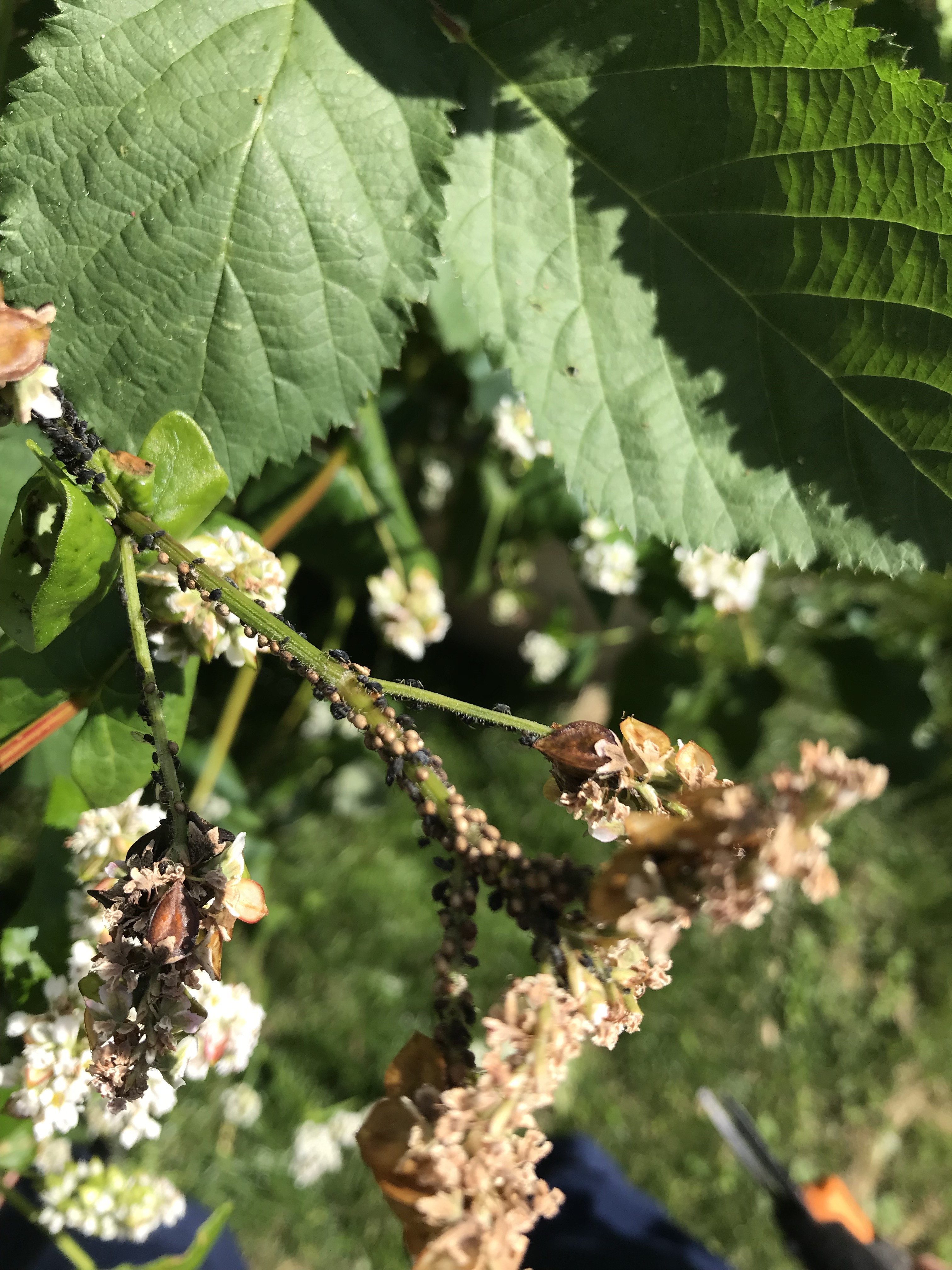 Buckwheat and alyssum attract predatory wasps of aphids. Look at the black aphids, and how many have been parasitized (the brown, round ones.)
Buckwheat and alyssum attract predatory wasps of aphids. Look at the black aphids, and how many have been parasitized (the brown, round ones.) -
Spread of Parasites: Wild-collected ladybugs can carry parasites that are not native to your local environment. Releasing these ladybugs can introduce these parasites to native ladybug populations, further weakening them and disrupting the natural balance.
-
Migratory Behavior: Ladybugs collected for commercial sale are often harvested during hibernation and then refrigerated to keep them dormant until they are sold. However, ladybugs are naturally migratory insects. When released into your garden, even if aphids are present, their instinct is to migrate back to their hibernation sites, often in mountainous regions like Colorado. This means they are likely to eat only a few aphids before leaving your garden, rendering them ineffective for long-term pest control.
-
Environmental Concerns: The commercial trade of wild-collected ladybugs requires special permits, and environmental groups have been raising concerns about this practice since the 1960s due to its negative impact on native ladybug populations and ecosystems.
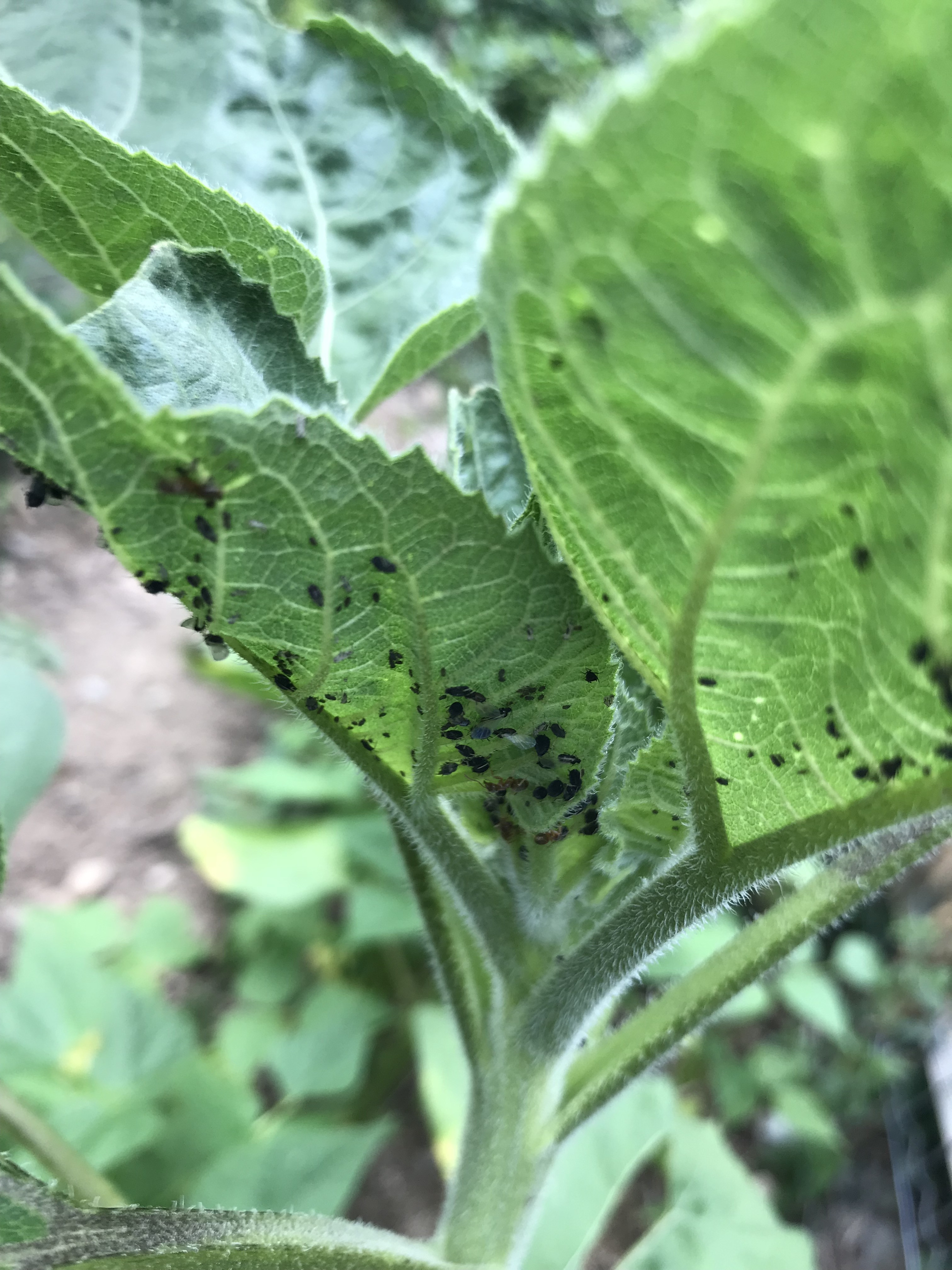 Black aphid on sunflower. I never treat aphids in my yard. I’d rather sacrifice a plant to attract predators them remove aphids (the gummy bears of nature – everything wants to eat them.)
Black aphid on sunflower. I never treat aphids in my yard. I’d rather sacrifice a plant to attract predators them remove aphids (the gummy bears of nature – everything wants to eat them.)
Lab-Produced Beneficial Insects: A Sustainable Alternative
In contrast to wild-collected ladybugs, there are commercially available beneficial insects that are lab-produced in controlled environments. These insects are specifically reared for pest control and offer a more sustainable and effective approach.
While lab-produced ladybugs are less common for general garden use, other beneficial insects like hoverflies, lacewings, and Aphidoletes aphidimyza are readily available and are far more effective aphid predators than commercially sold ladybugs.
Where Can You (Potentially) Buy Ladybugs?
If you are still determined to find “where can I buy ladybugs,” you will typically find them at:
- Garden Centers and Nurseries: Many local garden centers and nurseries sell ladybugs, particularly during the spring and summer gardening seasons.
- Online Retailers: Numerous online retailers specialize in selling beneficial insects, including ladybugs. A quick online search for “buy ladybugs” will yield many results.
- Big Box Stores: Some large home improvement and garden supply stores may also carry ladybugs seasonally.
However, it’s crucial to remember that regardless of where you purchase them, the vast majority of ladybugs available for sale are wild-collected. It’s very unlikely you will find lab-produced ladybugs for general garden aphid control.
Why Ladybugs Aren’t the Aphid Control Superheroes You Might Think
While ladybugs are known to eat aphids, they are not the most efficient or effective predators for aphid control, especially compared to other beneficial insects.
-
Ladybugs are Grazers, Not Voracious Predators: Adult ladybugs do eat aphids, but they primarily “graze” and are not as impactful in controlling aphid populations as other predators. They often arrive at the scene of an aphid infestation later than other beneficial insects.
-
Migratory Behavior Limits Effectiveness: As mentioned earlier, the migratory nature of commercially sold ladybugs means they often leave your garden quickly after release, limiting their long-term impact on aphid populations.
-
Better Alternatives Exist: Several other beneficial insects are far more effective at aphid control and are readily available commercially as lab-produced options. These include:
-
Aphidoletes aphidimyza: This midge larva is a highly effective aphid predator, used extensively in commercial greenhouses and gardens. They can consume hundreds of aphids and reproduce rapidly.
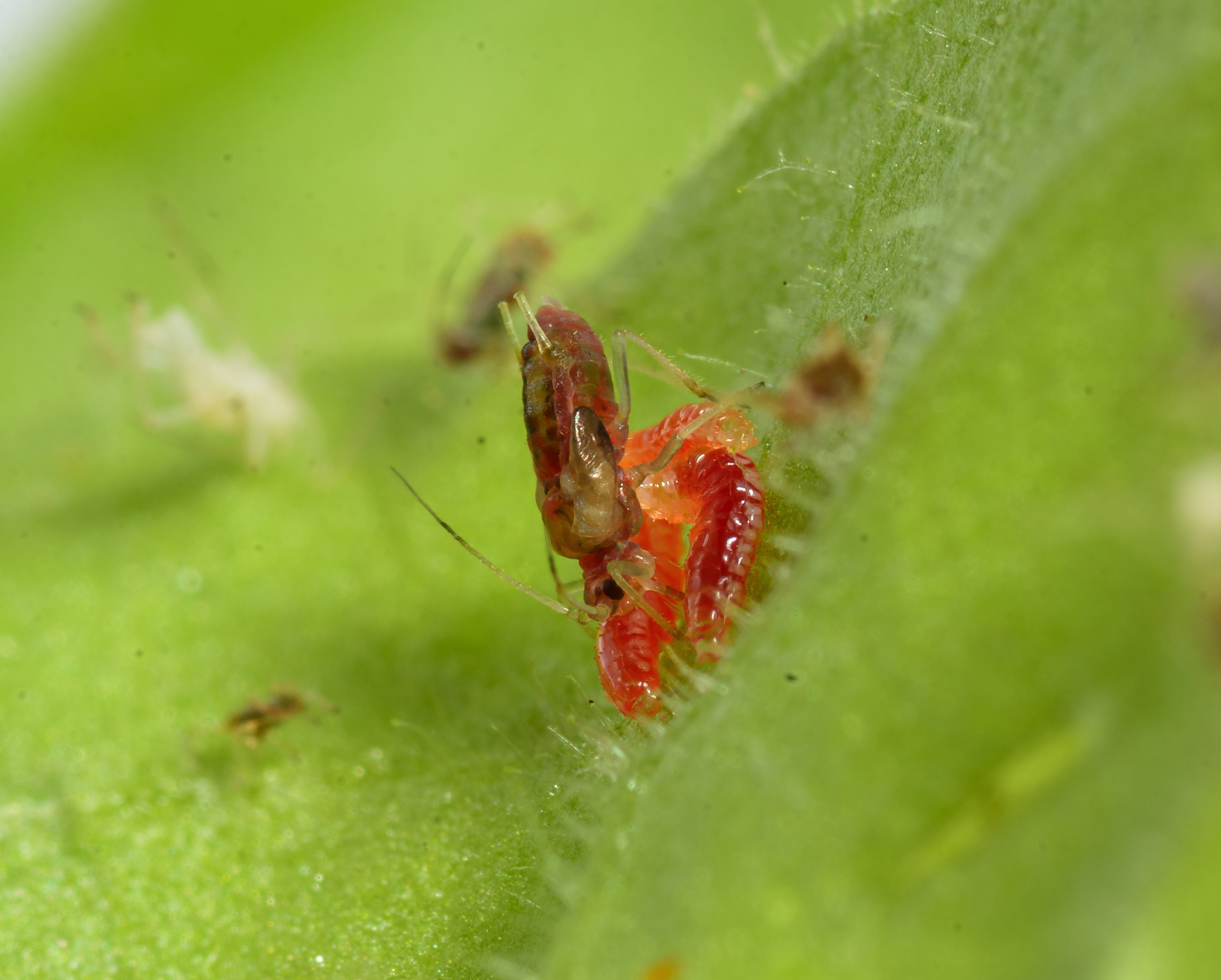 Aphidoletes larva sneaking up and feeding on an aphid from underneath.
Aphidoletes larva sneaking up and feeding on an aphid from underneath. -
Hoverflies (Eupeodes americanus): Hoverfly larvae are voracious aphid eaters, consuming even more aphids than ladybug larvae. Adult hoverflies are also important pollinators.
-
Brown Lacewings (Micromus variegatus): These nocturnal insects are highly effective aphid predators and generalist predators, staying in your garden and consuming a significant number of aphids.
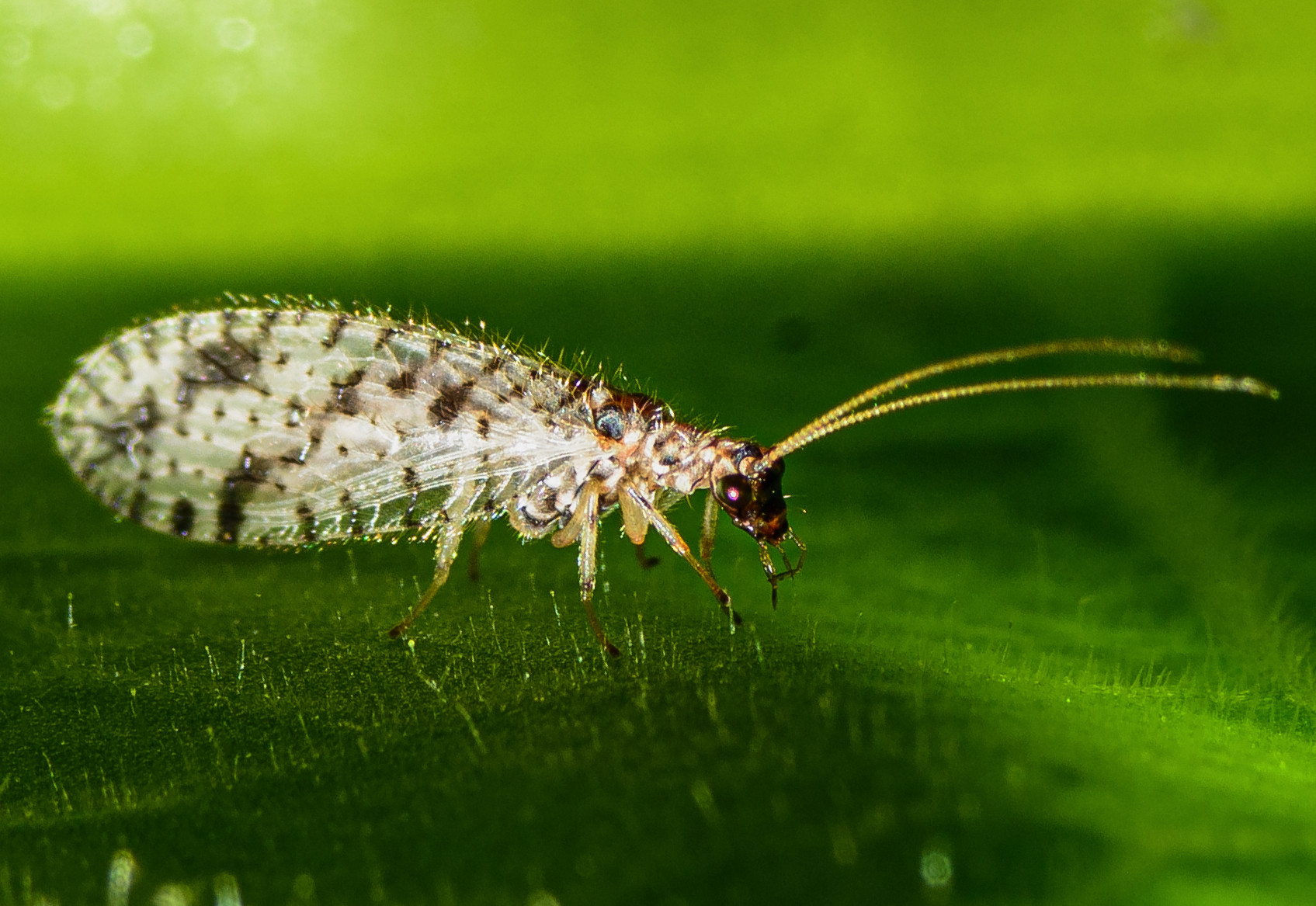 Micromus variegatus – The BrownLacewing. Small, elusive, but a top aphid and generalist predator that stays in your yard.
Micromus variegatus – The BrownLacewing. Small, elusive, but a top aphid and generalist predator that stays in your yard.
-
A Better Approach to Aphid Control: Encourage Natural Predators
Instead of focusing on “where can I buy ladybugs,” a more sustainable and environmentally friendly approach to aphid control is to create a garden environment that attracts and supports native beneficial insects.
-
Stop Using Chemical Pesticides: Chemical pesticides, including homemade remedies and even dish soap sprays, can harm beneficial insects and disrupt the natural ecosystem of your garden. Stopping the use of chemicals is the first step to attracting natural predators.
-
Plant a Variety of Plants: Biodiversity in your garden attracts a wider range of beneficial insects. Plant flowers and allow some plants to flower to provide nectar and pollen sources for predators like hoverflies and parasitic wasps.
-
Provide Overwintering Sites: Leave some leaf debris and undisturbed areas in your garden to provide overwintering habitats for native ladybugs and other beneficial insects.
-
Attract Parasitic Wasps: Native parasitic wasps like Aphidius are highly effective aphid parasitoids and will naturally appear in your garden if you avoid using chemicals. Buckwheat and alyssum are known to attract these beneficial wasps.
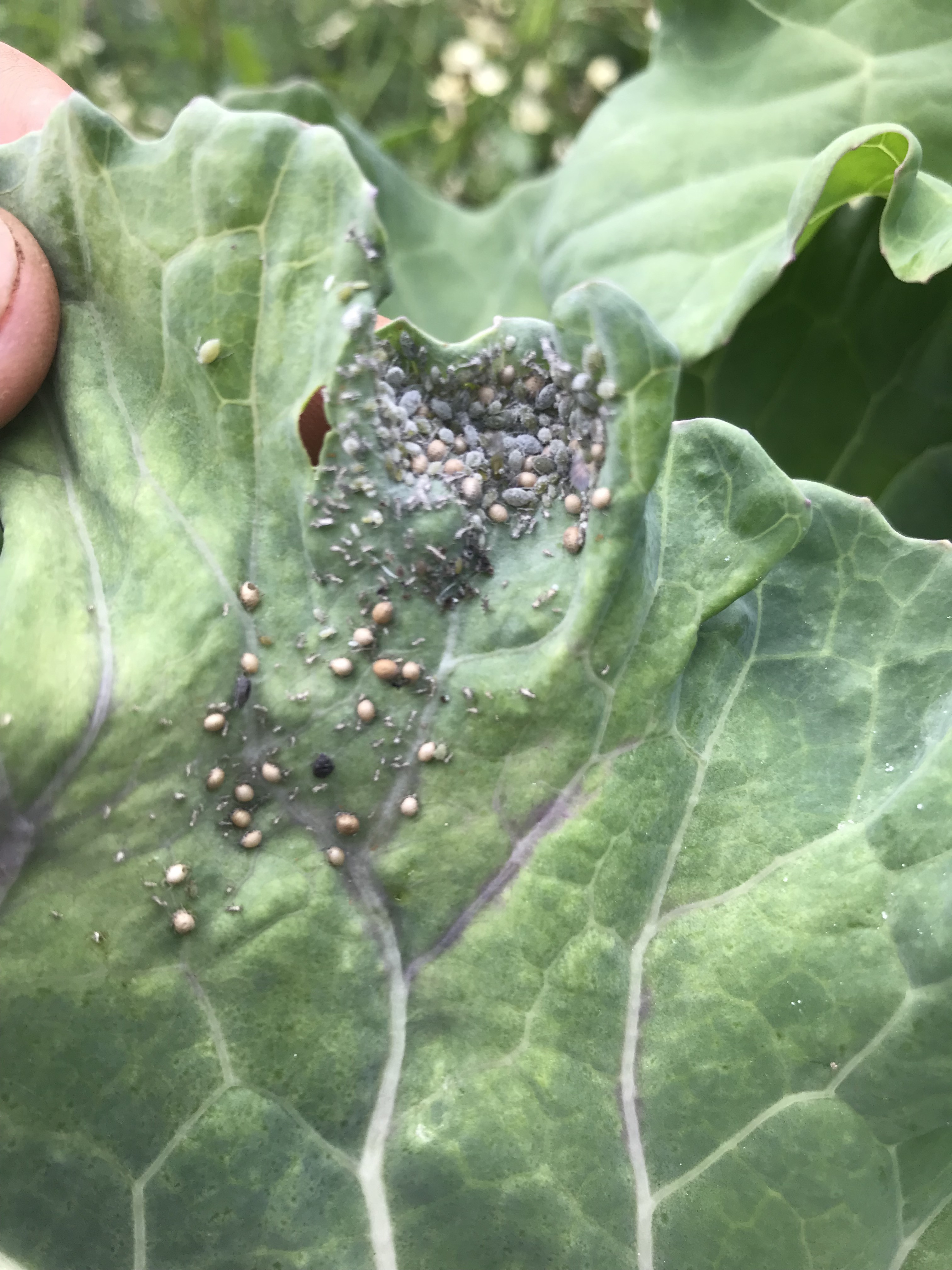 Untreated – this cabbage was quickly cleared of Cabbage aphid by a native Aphidius (a parasitic wasp of aphids). The swollen, bronze aphids have been parasitized – likely all the others too.
Untreated – this cabbage was quickly cleared of Cabbage aphid by a native Aphidius (a parasitic wasp of aphids). The swollen, bronze aphids have been parasitized – likely all the others too.
Conclusion: Reconsider Buying Ladybugs and Embrace Natural Pest Control
While you can find ladybugs for sale at various garden retailers, purchasing them is often not the best solution for aphid control. Wild-collected ladybugs are environmentally problematic, often ineffective, and there are far better alternatives available.
Instead of asking “where can I buy ladybugs,” consider focusing on creating a healthy, diverse, and pesticide-free garden that naturally attracts and supports a wide range of beneficial insects. This approach is more sustainable, environmentally responsible, and ultimately more effective for long-term pest management.
By embracing organic gardening practices and encouraging natural predators, you can create a thriving garden ecosystem where pests are naturally controlled, without the need to buy ladybugs.
Further Resources:
- Cornell University – Biological Control: https://biocontrol.entomology.cornell.edu/predators/Hippodamia.php
- IOBC Global: The International Organization for Biological Control: https://www.iobcnrs.org
- Applied Bio-Nomics – Distributor Map (for lab-produced beneficial insects): https://www.appliedbio-nomics.com/distributor-map/

